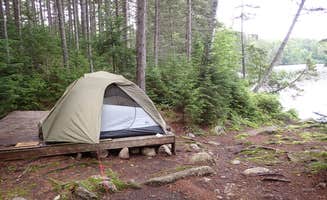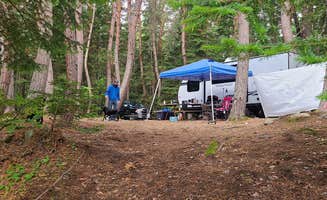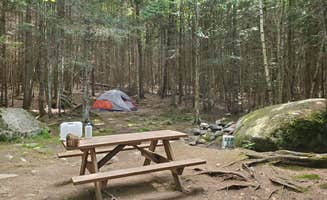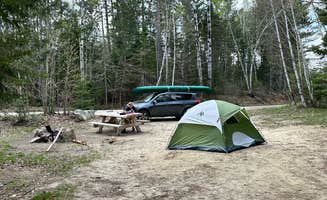Tent campsites near Pittsburg, New Hampshire range from backcountry island locations to remote riverside spots accessed by dirt logging roads. The Connecticut Lakes Region sits at elevations between 1,300 and 2,670 feet, creating cooler summer temperatures that rarely exceed 80°F even in July and August. Most primitive camping areas require visitors to bring their own drinking water and pack out all trash, with many sites only accessible via boat or substantial hikes through dense forest.
What to do
Paddling expeditions: The Magalloway River offers multi-day paddling routes with designated boat-in campsites. At Diamond Peaks, paddlers can access riverside tent sites with small fire rings. "It is a beautiful spot... I did enjoy catching a few fish off the dock in between swatting at the mosquitos," notes one visitor who recommends site #3 for its small beach area good for wading.
Wildlife observation: The remote waterways around Pittsburg provide excellent wildlife viewing opportunities. At Stephen Phillips Memorial Preserve Wilderness, campers report seeing moose and abundant bird life. "The lake is great for exploring both day and night. I've personally never seen so many stars as I did our on the lake in the evenings," writes one reviewer who visited with dogs.
Hiking the Cohos Trail: For backpackers seeking a more challenging experience, tent camping along the Cohos Trail provides access to quiet forest settings. Devil's Rest Shelter offers "a beautiful structure nestled in the woods, with a privy nearby and a bear box" according to one thru-hiker who described it as "a quiet, peaceful, well-maintained stop before heading further north."
What campers like
Island camping solitude: Tent campers frequently cite the profound quiet of island sites as a primary draw. One camper at Stephen Phillips Memorial Preserve notes "it's a rare treat to be in a location where sight and sound of others are absent. While a few sites might have a neighbor in view, most offer exceptional privacy."
Primitive waterfront access: Many campsites feature direct water access for swimming and fishing. "The site is just off the water and there is a nice long dock that makes it super easy to boat into and unload," writes a visitor to Smudge Cove, which also features "relatively easy access to the water by way of the rocks, beside the dock."
Abundant fishing opportunities: The region's lakes and rivers provide excellent fishing, especially at waterfront sites. A camper who stayed at Cupsuptic Lake Park & Campground mentions, "Tented here 30 years ago and in a motor home this year. It's a nice place on the lake. Nice beach with little seating coves along the waters edge, offers a little privacy."
What you should know
Facility limitations: Most remote sites have minimal facilities. At Eagle Cove, a camper reports challenging conditions: "There is a rough fire pit that had a stack of wood next to it that was clearly part of an old picnic table. The picnic table that was in the site was, well...let's call it a 'living picnic table.' It was not in great shape and was actively rotting."
Weather preparedness: Weather conditions can change rapidly on the lakes. One visitor to Stephen Phillips Memorial Preserve warns, "Weather can change quickly out there. Gets windy. So be prepared."
Insect intensity: Mosquitoes and black flies can be severe, particularly in June and early July. A Diamond Peaks visitor notes it is "VERY buggy here in July especially if there isn't a breeze" while another mentions "swatting at the mosquitos" being a constant activity.
Transportation logistics: Many tent sites require boat transportation. At Northern Waters Base Camp, the site "is right next to a public boat launch. While it does experience a lot of traffic (people, boats, cars, and USGS Hydro employees) it is the nicest site at the campground."
Tips for camping with families
Choose sites with swim access: Family-friendly tent sites with safe water access make for easier entertainment. At Cupsuptic Lake Park & Campground, "Nice campground. Super friendly people. Very busy campground, but everyone is very respectful. Great place for kids and families. Our site was right on the lake."
Consider noise levels: Some campgrounds experience heavy paddler traffic. Northern Waters Base Camp has sites situated "right on the Androscoggin River this small stretch of Class II whitewater is popular with all the area rafting companies. So if you find yourself here in the summer months, be prepared to be inundated with a multitude of people of all ages floating through the froth."
Pack extra supplies: Limited access to stores means bringing everything needed for children. For remote tent sites at Umbagog Lake, one family notes, "This trip consisted of my family of five with three kids (ages 5-13), our dog, and friends. We put our boats in at the National Wildlife Refuge and paddled in on Bear Brook. The paddle was just around 2.5 miles and calm flat water. Just perfect for our kids."
Tips from RVers
Access road conditions: Many roads to camping areas around Pittsburg become difficult after rain. At Northern Waters Base Camp, "The road can get rutted and be very muddy, full of puddles and buggy," according to one camper who preferred the site farthest from the office for this reason.
Rental options for big groups: At Northern Waters Base Camp, "We had a large group and a site right on the river. Sites are small but you can fit comfortably. Staff was extremely friendly and helpful." Another visitor notes, "Several large groups book nights here so be sure to call ahead if you want to stay."
Supply access: While many sites are remote, some have nearby provisions. A camper at Northern Waters Base Camp notes, "There is a large local sporting goods store, L.L. Cote, just down from the campground. Here you can re-stock on all your camping supplies, groceries and even scarf down some pizza and ice cream! It's definitely within walking distance of the campground."










